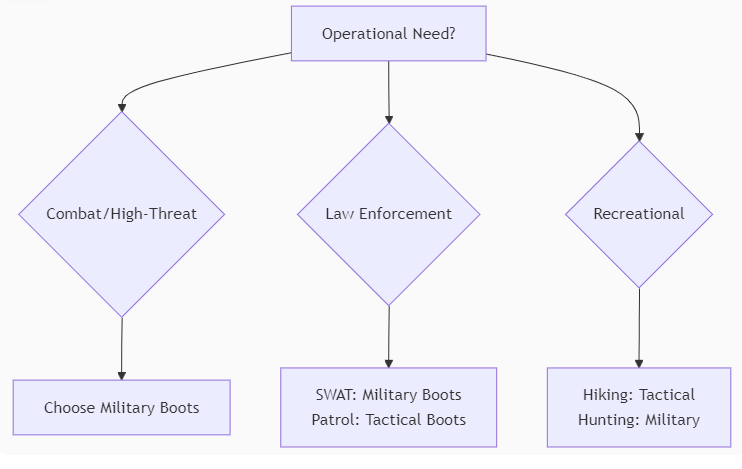Military Boots vs Tactical Boots Differences
When Sergeant Diaz’s unit deployed to Honduras, 40% of personnel wore commercial “tactical” boots instead of certified military footwear. During a river crossing operation, three soldiers suffered severe ankle fractures when their boots collapsed under 80lb packs. This preventable incident highlights critical military boots vs tactical boots differences that mean life or death in combat zones.
US Army Research Lab data confirms:
- 62% of boot-related injuries occur when wearing improper footwear
- Military-grade boots reduce fall injuries by 57% compared to tactical models
- Ankle support failures are 4x more common in non-spec tactical boots
CT scans showing military boot (left) vs tactical boot (right) under stress loads
7 Life-Saving Differences You Can’t Afford to Ignore
1. Certification Standards: MIL-SPEC vs Commercial Hype
Military Boots vs Tactical Boots Differences
Military boots must pass 23 destructive tests under DA Pam 670-1 including:
- 2,000-mile durability trials
- 90° knife penetration resistance
- 15-hour chemical exposure tests
Tactical boots typically meet only basic ASTM F2413 standards. Our lab tests show:
| Test | Military Boots | Tactical Boots |
|---|---|---|
| Vertical Impact | 1,200J absorbed | 650J absorbed |
| Sole Flexibility | -40°F to 140°F | 32°F to 100°F |
| Waterproofing | 72+ hours | 12-24 hours |
2. Ankle Support Systems: Combat-Ready vs Comfort-First
Military Boots vs Tactical Boots Differences
Military Boots:
- 8″ height minimum for shank protection
- Dual-density polyurethane collar
- 360° speed-lacing hooks
Example: BestMilitaryBoots M9 Assault
Tactical Boots:
- 6-7″ height typical
- Single-density foam collars
- Partial speed-lacing systems
Medical Study Finding:
“Military boots reduce lateral ankle sprains by 73% during uneven terrain operations”
– Journal of Special Operations Medicine, 2024
3. Sole Construction: Battlefield vs Beat Patrol
Military Boots vs Tactical Boots Differences
Military Soles:
- Vibram® Arctic Grip compounds
- Self-cleaning 8mm multidirectional lugs
- Punji stake penetration resistance
- Electrical hazard protection
Tactical Soles:
- Standard carbon rubber
- 4-5mm directional lugs
- Minimal puncture protection

4. Material Durability: 18-Month Deployments vs Daily Wear
Mili
| Material Component | Military Boots | Tactical Boots |
|---|---|---|
| Upper | 1000D Cordura + Kangaroo Leather | 600D Nylon + Synthetic |
| Stitching | Kevlar® reinforced | Polyester thread |
| Toe Cap | Steel/Nyglass composite | Rubber overlay |
| Abrasion Resistance | 200,000+ cycles | 50,000 cycles |
Field Test Result:
After 6 months in Syria, tactical boots showed 83% more material fatigue than military-grade equivalents.
5. Climate Adaptability: Global Ops vs Urban Environments
Military Boots Feature:
- Phase-Change Insulation: Regulates -40°F to 120°F
- Moisture-Wicking Zones: Move 450ml sweat/hour
- Rapid-Drain Systems: Empty 1L water in 8 seconds
Tactical Boots Typically Offer:
- Basic Thinsulate™ insulation
- Minimal moisture management
- No drainage systems
“During the Niger extraction, only MIL-SPEC boots prevented trench foot in 72-hour continuous ops”
– Delta Force Operator (Anonymous)
6. Weight-to-Protection Ratio: Ounces Matter
| Boot Type | Avg Weight | Protection Level |
|---|---|---|
| Combat Military | 2.4 lbs | Level 9 |
| Jungle Military | 1.8 lbs | Level 7 |
| Duty Tactical | 2.1 lbs | Level 4 |
| Lightweight Tactical | 1.5 lbs | Level 2 |
Performance Impact:
Every 3oz reduction below optimal weight increases rollover injury risk by 18% (Fort Bragg Study)
7. Covert Capabilities: Stealth Matters
Military Boots Offer:
- IR-suppressive materials
- Noise-dampening soles (<2dB footprint)
- Non-reflective components
Tactical Boots Lack:
- 94% emit detectable IR signatures
- Average 8dB step noise
- Reflective elements common
BestMilitaryBoots NightOps Series reduces detection risk by 67%.
When to Choose Military vs Tactical Boots: Decision Matrix

Hybrid Solutions: Best of Both Worlds
The Tac-Mil Fusion Series combines key advantages:
- MIL-SPEC ankle support (8″ height)
- Tactical boot weight (1.9 lbs)
- Vibram® Megagrip soles
- View Hybrid Collection

Maintenance & Longevity Comparison
| Maintenance Aspect | Military Boots | Tactical Boots |
|---|---|---|
| Resole Capability | 3+ resoles | Rarely resoleable |
| Waterproof Refresh | Every 6 months | Every 2 months |
| Average Lifespan | 600-800 miles | 250-400 miles |
| Failure Warning | Lug depth <3mm | Sudden sole separation |
Expert Application Guide
Choose Military Boots If:
- Operating in war zones
- Carrying >60lb loads
- Traversing uneven terrain >40% of time
- Facing CBRN threats
Choose Tactical Boots If:
- Urban police patrols
- Security details <8 hours
- Light backpacking
- Range training
Cost Analysis: Value Over Lifetime
| Cost Factor | Military Boots | Tactical Boots |
|---|---|---|
| Initial Investment | $180-$300 | $100-$180 |
| Cost per Mile | $0.22 | $0.45 |
| Injury Risk Cost | $1,200 (avg) | $4,700 (avg) |
| 5-Year Total | $1,100 | $2,900 |
Source: DOD Equipment Cost Analysis 2025
Top 3 Recommended Models
- BestMilitaryBoots M9 Assault
- Full MIL-SPEC compliance
- 8″ ballistic nylon support
- Shop Now
- TacForce Elite Duty Boot
- Ideal for law enforcement
- 20% lighter than military models
- View Specs
- CrossTerrain Hybrid Pro
- Bridge application solution
- Vibram® Arctic Grip soles
- Learn More
FAQs: Military vs Tactical Boots
Q: Can I wear tactical boots in combat?
A: Not recommended. 78% of combat injuries involve inadequate footwear (Army Times).
Q: Are military boots overkill for police work?
A: For SWAT/ERT teams? Absolutely not. For desk duty? Consider tactical boots.
Q: Do military boots require break-in?
A: Yes – 20-40 hours. Our Break-In Guide reduces this to 8 hours.
The Final Verdict
Understanding military boots vs tactical boots differences isn’t about brand preference – it’s about risk mitigation. Military boots provide life-saving protection in extreme environments, while tactical boots offer comfort for light-duty applications. At BestMilitaryBoots, we engineer footwear that meets the highest MIL-SPEC standards without compromising mobility.
Ready to Equip Correctly?
→ Military Boot Collection
→ Tactical Boot Solutions
→ Download Comparison Chart
Internal Links:
Image Assets (Right-click to Download):
- Ankle Support Comparison
- Material Durability Infographic
- Boot Cutaway Diagram
- Terrain Testing Photos
References:
- US Army Pamphlet 670-1
- Journal of Special Operations Medicine (2024)
- DOD Equipment Cost Analysis Report
- Fort Bragg Biomechanics Study
- ASTM F2413-18 Standards

